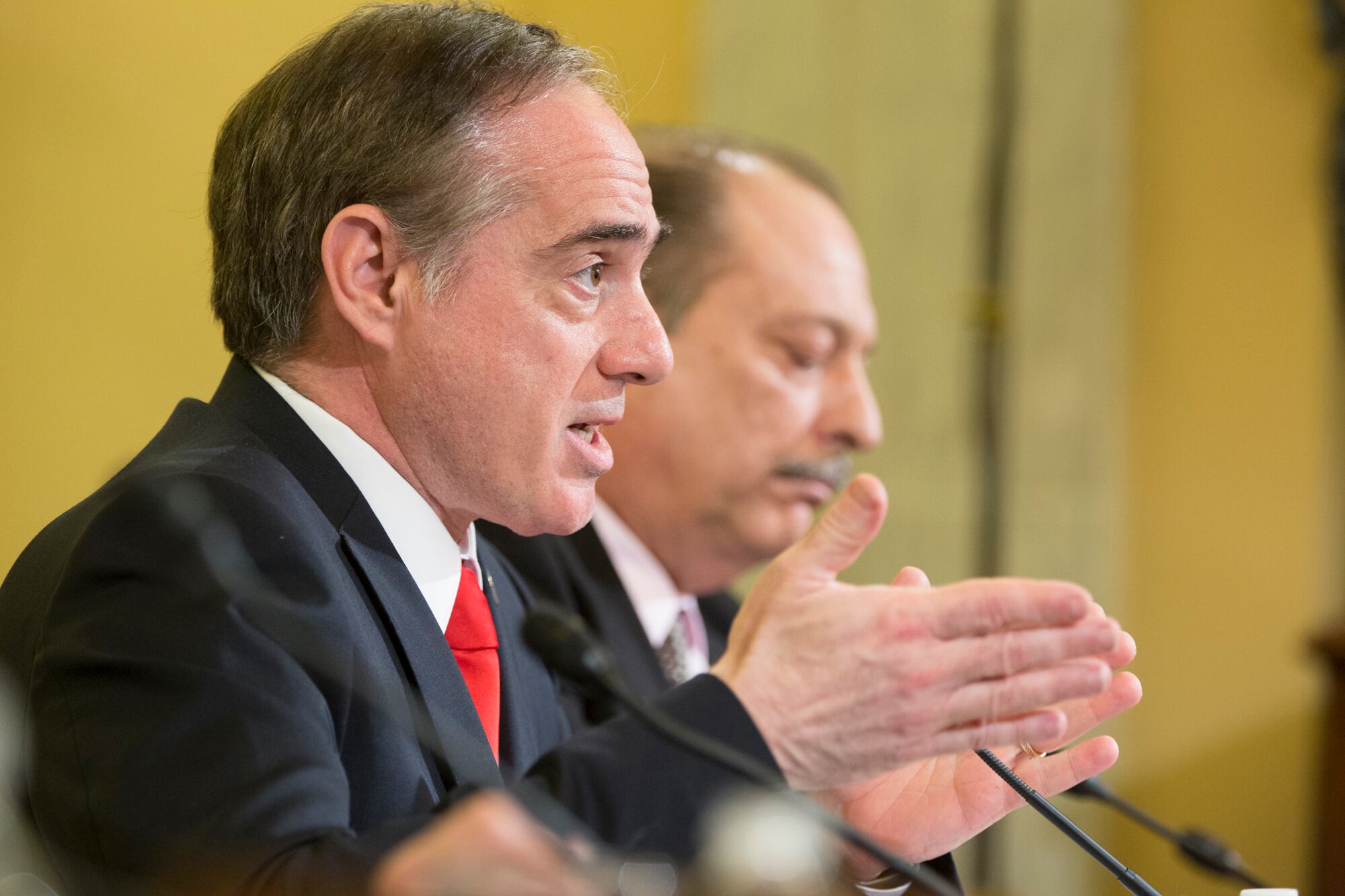WASHINGTON — The Veterans Affairs Choice program, hailed by President Trump as a key lifeline to veterans, is on pace to run out of money later this summer, potentially causing major disruptions in thousands of veterans' medical care.
Congress believed they had solved this problem earlier this year, by passing an extension of the program's rules to keep it operating until late 2018.
But on Wednesday, in testimony before the Senate Veterans' Affairs Committee, VA Secretary David Shulkin said higher than expected usage of the program will likely cause a funding shortfall before the end of the summer.
"We now have too little money in the Choice account," he said. "We have enough money to make sure veterans can get the care they need (in other accounts). We need help getting it to the right places."
The program balance dropped from $2 billion at the start of March to less than $850 million this month.
As a result, VA officials are asking to move around money from other outside care programs to cover the Choice program, the opposite problem lawmakers anticipated when they passed the extension. Committee ranking member Sen. Jon Tester, D-Mont., called the news upsetting.
"For this to happen this late in the game is frustrating to me," he said.
The news came as Shulkin presented Trump's plans for a $186.5 billion VA budget for fiscal 2018, nearly a 6 percent increase from current funding levels. The VA secretary said that includes $13.2 billion for outside care programs next year, a figure he says should be sufficient to meet department needs.
The Choice program — one of multiple offerings by the department for veterans to seek medical care outside the VA system — has been a controversial topic ever since it was created in 2014.
Critics have lamented it as a precursor to privatization of VA services, while supporters of the concept have blasted department officials for overly bureaucratic rules governing the program.
It was created in the wake of the 2014 VA wait times scandal to cut down on wait times for veterans frustrated with a lack of access to VA health care. Eligible individuals who face lengthy waits for VA medical appointments or who live 40 miles from the nearest VA facilities have the option to seek care with private physicians, with the department picking up the costs.
Lawmakers set aside $10 billion for the program in 2014, with a deadline of August 2017 for all of the funding to be used.
Earlier this year, they lifted that expiration date after Shulkin said he expected about $1 billion to be available at the start of August, and that the funding would be needed as a bridge to a new ""Choice 2.0" plan designed to consolidate a host of outside care programs.
Now that money appears to be used up, and lawmakers and Shulkin still have not unveiled their specific replacement plans. Last week, Shulkin announced the name for the new initiative — the Veterans Coordinated Access and Rewarding Experiences program (Vets CARE) — but promised more details on eligibility and operations in weeks to come.
The program has grown dramatically in recent years. Shulkin said in fiscal 2016 alone, more than 2 million authorizations were granted through Choice funds, and the first quarter of fiscal 2017 saw an increase of more than 30 percent from the same period a year earlier.
In April, when Trump signed the Choice extension into law, he praised the program as "a good start" but added that "there is still much work to do" to reform veterans health care offerings.
"We will fight each and every day to deliver the long-awaited reforms our veterans deserve, and to protect those who have so courageously protected each and every one of us," he said. "We've made a lot of strides for the veterans."
White House officials have consistently cited the Choice extension as a major legislative victory, since the measure passed with bipartisan support.
With the money running out early, the major impetus behind the legislation now appears moot, although the measure did also include changes to how private-sector physicians receive payments from the government.
But VA officials have warned that gaps in funding could disrupt veterans medical care, potentially delaying or cancelling appointments.
At the hearing, Senate Veterans’ Affairs Committee Chairman Johnny Isakson, R-Ga., seemed open to the idea of authorizing the funding transfers. Shulkin and his predecessor, former VA Secretary Bob McDonald, have both lobbied Congress for more funding flexibility, to avoid similar problems in the future.
But officials from the American Legion in a statement said they oppose "this cannibalization of services to fund the Choice Program" and instead support plans to consolidate existing care programs "into one simple, efficient, responsive, and transparent process."
Leo Shane III covers Congress, Veterans Affairs and the White House for Military Times. He can be reached at lshane@militarytimes.com.
Leo covers Congress, Veterans Affairs and the White House for Military Times. He has covered Washington, D.C. since 2004, focusing on military personnel and veterans policies. His work has earned numerous honors, including a 2009 Polk award, a 2010 National Headliner Award, the IAVA Leadership in Journalism award and the VFW News Media award.





